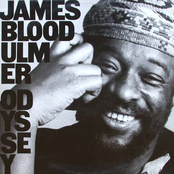Odyssey

Biography
From wikipedia - http://en.wikipedia.org/wiki/Odyssey_%28James_Blood_Ulmer_album%29 "Odyssey is an album by American guitarist James Blood Ulmer recorded in 1983 and released on the Columbia label. It was Ulmer's final of three albums recorded for a major label. Tales of Captain Black was a startling debut, but Odyssey stands as James Blood Ulmer's signature masterpiece, the purest and most accessible showcase for his bold, genre-clashing guitar vision. With minimal trio accompaniment -- only...
From wikipedia - http://en.wikipedia.org/wiki/Odyssey_%28James_Blood_Ulmer_album%29 "Odyssey is an album by American guitarist James Blood Ulmer recorded in 1983 and released on the Columbia label. It was Ulmer's final of three albums recorded for a major label. Tales of Captain Black was a startling debut, but Odyssey stands as James Blood Ulmer's signature masterpiece, the purest and most accessible showcase for his bold, genre-clashing guitar vision. With minimal trio accompaniment -- only drummer Warren Benbow and violinist Charles Burnham -- Ulmer's guitar is always the meat of the ensemble, especially since his unique tuning (developed specially for this album) allows him to cover bass parts as well as guitar leads. Save for the title track, his playing isn't as jagged or fragmented as on past efforts. Part of the reason is his conscious emphasis on the smoother tones of Burnham's amplified violin, which is often fed through a wah-wah pedal; his solos often resemble the faux-orchestral sounds electric guitarists can create by skillfully manipulating their volume controls. It lends an almost pastoral tint to Ulmer's skittering avant jangle, which is otherwise firmly rooted in downtown New York. Few other scenes could have nurtured Ulmer's blend of free jazz, blues, rock & roll, funk, and punk (by way of no wave noise rock). And Odyssey mixes them all freely yet cohesively, as though there had never been a line separating the most experimental musical forms from the earthiest. The instrumentals are particularly inspired examples: The opener "Church" contrasts freely improvised passages with spare James Brown grooves; the droning, Eastern-tinged "Love Dance" features soaring interplay between Ulmer and Burnham; and the closing "Swing & Things" switches between dissonant jazz-rock and straight-up guitar boogie. In addition, Ulmer's vocals are showcased at their most effective on the blues "Little Red House," the Jimi Hendrix-style ballad "Please Tell Her," and a major-label revisitation of his signature tune, "Are You Glad to Be in America?" All the pieces come together to produce not only Ulmer's finest album, but a certified classic of the modern jazz avant-garde. Read more on Last.fm. User-contributed text is available under the Creative Commons By-SA License; additional terms may apply.
